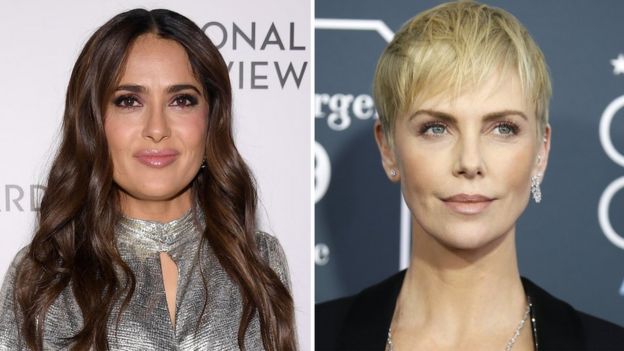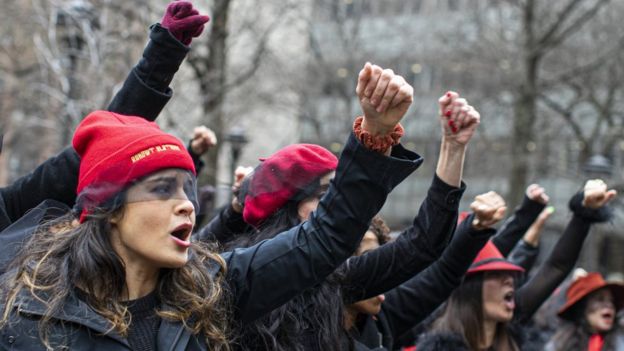
Harvey Weinstein is about to go on trial - and 12 men and women in New York will be responsible for determining whether he is guilty.
Jury selection is currently under way, with the former Hollywood producer accused of five charges, including rape and predatory sexual assault relating to two alleged victims.
But finding impartial juries for such a high-profile case - one that galvanised the #MeToo movement across the world - could be difficult.
The court has summoned 2,000 potential jurors for the case - about five times more than normal - just to find 12 suitable regular jurors and six alternate jurors.
And on the very first day of jury selection, a third of the potential jurors present were dismissed outright, after telling the judge they did not think they could be impartial.
"The first few days of jury selection has already underscored just how challenging it's going to be," Valerie Hans, a law professor and jury expert at Cornell University says.
"When you have large numbers of people saying they can't be impartial, it's a wakeup call - because most people think of themselves as generally fair."

Salma Hayek and Charlize Theron have been named as possible witnesses for the trial
Jury selection often takes no more than a few hours, or a day or two.
But the process can be much more drawn out, particularly in high-profile trials. In the O.J. Simpson murder trial, it took almost 11 weeks for a jury to be selected.
The judge in the Harvey Weinstein trial has allocated two weeks for jury selection, while the entire trial is expected to last up to two months - which means many potential jurors will be put off by the amount of time required.
And in this case, "claims have been made against Weinstein by very high profile, high visibility people" - there has been "extensive publicity" and a high number of claims against him, which could make jury selection even more difficult, Prof Hans said.
Xorje Olivares, who attended the court on 8 January as a prospective juror, was one of the dozens of people who ruled themselves out.
He told the BBC his support for the #MeToo movement, and the fact he knew several people who were sexual assault survivors, meant he felt he could not be impartial.
"I personally felt nothing but disgust... even being in the same room as him, I just felt very icky," Mr Olivares, who hosts a radio show, said. "I knew that I had these biased views, and I would bring them to the case."
On the other hand, supermodel Gigi Hadid - who had also reported for jury duty - told the court she could remain impartial, despite having met Weinstein and actress Salma Hayek, one of the trial's potential witnesses.
Hadid, who lives in Manhattan and studied criminal psychology, told the judge she would "keep an open mind on the facts" if selected.
Although it's known as jury selection, it's actually a process of elimination.
Many prospective jurors are being dismissed from the outset - either because they say they cannot be impartial, or because they have scheduling conflicts.
Those remaining are asked to complete a questionnaire, where they are asked about their education, prior jury service, whether they know people working in the entertainment industry, and whether they have been a victim of physical or sexual abuse.
Then, lawyers for both sides can question them in court, and get potential jurors dismissed if the judge agrees that they are not impartial - this is known as a challenge for cause.
In the US, lawyers are also allowed to remove a number of potential jurors without giving a reason (known as a peremptory challenge), as long as it isn't on the basis of ethnicity or gender.
Peremptory challenges are controversial to some - the UK abolished them in 1988 - because critics believe that lawyers can try to skew juries in a particular way and a randomly selected jury is fairer.
However, in the US, they're considered an important part of the constitutional right to trial by an impartial jury.
In Mr Weinstein's trial, lawyers on each side are allowed to dismiss up to 20 potential regular jurors, says Prof Hans. Lawyers from both sides will try to establish a jury that they believe will be more favourable to their side.

Harvey Weinstein has been attending court with a zimmer frame
The prosecution will want jurors who can relate to the alleged victims, while the defence will want jurors who "see themselves as the defendant", says Thaddeus Hoffmeister, a law professor at the University of Dayton.
He believes the prosecution may want to select younger jurors, due to their understanding of the #MeToo movement.
He adds that Mr Weinstein is "in a unique position" that "a lot of people will have difficulty relating to".
"You really would need a jury of CEOs, or people who have been in position of power."
Mr Weinstein's team has employed a jury consultant - an expert who will assist the lawyers with jury selection, including through community surveys and developing profiles of favourable and unfavourable jurors.
They are also likely to search public social media postings from all prospective jurors to see whether they have commented on the #MeToo movement - although they are not allowed to "friend" jurors.
"Each side will have an ideal juror they're looking for," says Alan Tuerkheimer, a jury consultant. However, they cannot be too obvious about who they want - because if it's clear they want a potential juror, the other side would "probably strike them out".
Instead, he likens it to a "chess game" - where each side tries to guess which jurors are good for their opposition, and then dismiss them.
"The defence are going to want jurors who believe women sometimes make things up to get powerful men in trouble... the prosecution will want people who think that any questioning of the account of victims is off limits."
Prof Hans says the questionnaire results, and online research, can often help lawyers "identify in advance people who will be close minded to their case".
This is particularly useful if it lets them ask the potential jurors questions that demonstrate to the judge that they are not impartial - because then they can be dismissed by a "challenge for cause", without the lawyers using up one of their peremptory challenges.
Finally, with any high-profile trial, there is also the risk of "stealth jurors" - potential jurors with an agenda, or who hope to write a tell-all book afterwards.
"If someone seems too eager to get on a jury, all parties should be careful," Mr Tuerkheimer says, adding that this has led to retrials in the past.
In the US, the names of jurors are often publicly available - and former jurors have faced intense media attention, or fallen out with family and friends who disagree with their verdict.

Harvey Weinstein's trial has attracted protesters
James Matsumoto, who was jury foreman in the first corruption trial of former Illinois Governor Rod Blagojevich, remembered that the court room was packed with journalists when he was questioned as a potential juror.
"There must have been several hundred people on the courtroom at the time. It was a little unnerving, because you don't have anyone there with you in the jury box - you're alone and handed a microphone so that everyone in the court room can hear what you have to say."
He believes that the high-profile nature of the trial helped focus the minds on the jury, because it made them aware of how important the case was.
One unexpected consequence was the fact that "most people gained weight" during the trial, which lasted nearly two months.
Jurors were sequestered during the day, and had to eat lunch together in court, which meant "you're not getting very much exercise, and it's all fast food because you need something quick and near the court house".
He was surprised to find that journalists were even interested in finding out where the jury ordered lunch - considering it a "coup" when they were able to publish their lunch choices.
But the media attention became "really intense" once the trial ended - with the jury finding Blagojevich guilty on one count, but unable to reach an unanimous verdict on 23 other charges.
On his way home, he noticed "a whole bunch of people standing in front of my house".
He said a reporter approached him, asking if he was James Matsumoto - and he tried to divert him by saying "no, I think he lives down the block" - but ultimately he was still recognised.
"That night the phone kept ringing and the answering machine became full. My wife wasn't expecting anything like that, so she was very upset with all the attention," he said.
Other jury members had journalists knocking at their doors - while one found a helicopter hovering over their home.
The trial made a lasting impression on Mr Matsumoto. To this day, he says it bothers him that his jury was not able to reach a consensus on the charges. (At a retrial a year later, Blagojevich was found guilty of 17 charges, and sentenced to 14 years in jail.)
Despite this, Mr Matsumoto says if asked to be a juror again, he would. "For me it was a good experience - I learned more about human nature than I did before, and the nature of truth."
"Most Americans don't want to serve on trials - but I think it's our duty as citizens to be jurors."
His advice to jurors in the Harvey Weinstein trial is simple: "Do everything the judge instructs, just pay attention, and deliberate with honesty."